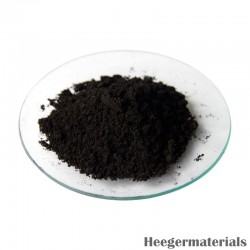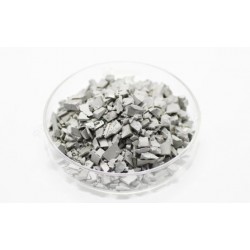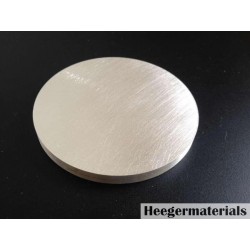Ruthenium
- Products
- Deposition Materials
- Refractory Metals
- Rare Earth Materials
- Powder
- Technical Ceramics
- Lanthanum Hexaboride (LaB6) Materials
- Pyrolytic Boron Nitride (PBN) Products
- Boron Nitride (BN) Products
- Alumina Ceramics (Al2O3)
- Aluminum Nitride (AlN) Products
- Silicon NItride (Si3N4) Ceramics
- Silicon Carbide (SiC) Ceramics
- Graphite Products
- Zirconia Ceramic
- MAX Phase Ceramic Materials
- Boron Carbide Ceramics (B4C)
- Magnesium Oxide Ceramics (MgO)
- Quartz Ceramics
- Macor Machinable Glass Ceramic
- Beryllium Oxide (BeO) Ceramics
- Piezoelectric Ceramics
- High Purity Materials
- Precious Metals
- Chemicals
- Crystals & Substrates
- Applications
- Other
Ruthenium (Ru) is a silvery-white precious metal belonging to the platinum group of elements with an atomic number of 44. It has a high melting point (2334 °C) and a high boiling point (4150 °C). It has excellent catalytic activity, electrical conductivity, and corrosion resistance, widely used in hydrogenation, chlorination, and electrochemical reactions.
Ruthenium (Ru) is a silvery-white precious metal belonging to the platinum group of elements with an atomic number of 44. It has a high melting point (2334 °C) and a high boiling point (4150 °C). It has excellent catalytic activity, electrical conductivity, and corrosion resistance, widely used in hydrogenation, chlorination, and electrochemical reactions.
Ruthenium There are 3 products.
Ruthenium On Carbon Catalyst | Ru/C...
Ruthenium on Carbon Catalyst is a highly effective catalyst with ruthenium supported on carbon. It is widely used in hydrogenation, dehydrogenation, and organic synthesis, offering excellent stability, high selectivity, and reusability. The ruthenium content can be customized to meet specific needs.
Ruthenium (Ru) Evaporation Material
High Purity Evaporation Materials in the form of pieces, granules or pellets. Packed in glass vials in quantities varying from 5-25 grams and used for thin-film research, thermal evaporation and electron microscopy coatings. HM is a leading vendor of high-purity Ruthenium (Ru) Evaporation Material. Our evaporation materials are available in various...
Ruthenium (Ru) Sputtering Target
Ruthenium Sputtering Target can be used in semiconductor, chemical vapor deposition (CVD), physical vapor deposition (PVD) display, and optical applications. We are a supplier of high-quality Ruthenium Sputtering Target at competitive prices.
Ruthenium (Ru) Properties
- Chemical Stability: Ruthenium has high chemical stability, resistant to acids, alkalis, and oxidizing environments.
- Hardness and Strength: Ruthenium is a hard metal with good wear resistance.
- Electrical Conductivity: Ruthenium has excellent electrical conductivity, making it suitable for certain applications in the electronics industry.
- Corrosion Resistance: Ruthenium has excellent corrosion resistance, especially in high-temperature and highly corrosive environments.
- Catalytic Properties: Ruthenium is a very effective catalyst, especially in hydrogenation and chlorination reactions.
Ruthenium (Ru) Applications
- Catalysts: Ruthenium is commonly used in petroleum refining, chemical catalysis, hydrogenation, and dehydrogenation reactions.
- Electronic Components: Ruthenium is used in manufacturing electrical contact materials, resistors, and other electronic components.
- Solar Cells: Ruthenium is used as an electrode material in certain high-efficiency solar cells.
- Hard Alloys: Ruthenium is used in alloys to enhance hardness and wear resistance, widely applied in tool manufacturing and mechanical components.
- Chemical Sensors: Ruthenium is used in certain chemical sensors and detectors to enhance response capabilities.
- Jewelry and Decorations: Due to its rarity and aesthetic properties, ruthenium is occasionally used in high-end jewelry and decoration.




